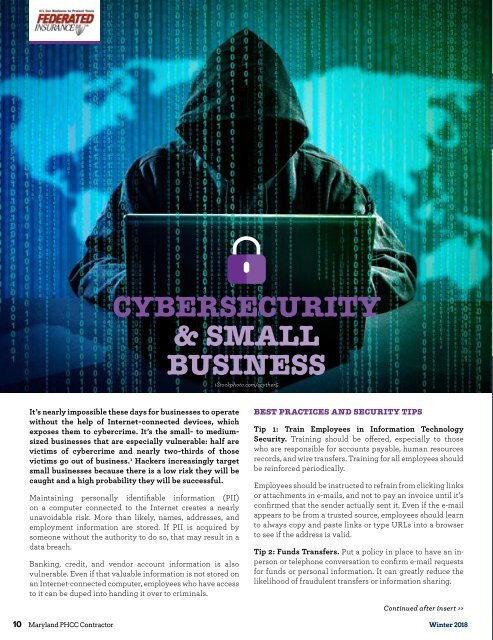Maryland PHCC Contractors Winter 2018
Create successful ePaper yourself
Turn your PDF publications into a flip-book with our unique Google optimized e-Paper software.
CYBERSECURITY<br />
& SMALL<br />
BUSINESS<br />
iStockphoto.com/scyther5<br />
It’s nearly impossible these days for businesses to operate<br />
without the help of Internet-connected devices, which<br />
exposes them to cybercrime. It’s the small- to mediumsized<br />
businesses that are especially vulnerable: half are<br />
victims of cybercrime and nearly two-thirds of those<br />
victims go out of business. 1 Hackers increasingly target<br />
small businesses because there is a low risk they will be<br />
caught and a high probability they will be successful.<br />
Maintaining personally identifiable information (PII)<br />
on a computer connected to the Internet creates a nearly<br />
unavoidable risk. More than likely, names, addresses, and<br />
employment information are stored. If PII is acquired by<br />
someone without the authority to do so, that may result in a<br />
data breach.<br />
Banking, credit, and vendor account information is also<br />
vulnerable. Even if that valuable information is not stored on<br />
an Internet-connected computer, employees who have access<br />
to it can be duped into handing it over to criminals.<br />
BEST PRACTICES AND SECURITY TIPS<br />
Tip 1: Train Employees in Information Technology<br />
Security. Training should be offered, especially to those<br />
who are responsible for accounts payable, human resources<br />
records, and wire transfers. Training for all employees should<br />
be reinforced periodically.<br />
Employees should be instructed to refrain from clicking links<br />
or attachments in e-mails, and not to pay an invoice until it’s<br />
confirmed that the sender actually sent it. Even if the e-mail<br />
appears to be from a trusted source, employees should learn<br />
to always copy and paste links or type URLs into a browser<br />
to see if the address is valid.<br />
Tip 2: Funds Transfers. Put a policy in place to have an inperson<br />
or telephone conversation to confirm e-mail requests<br />
for funds or personal information. It can greatly reduce the<br />
likelihood of fraudulent transfers or information sharing.<br />
Continued after insert >><br />
10 <strong>Maryland</strong> <strong>PHCC</strong> Contractor <strong>Winter</strong> <strong>2018</strong>


















